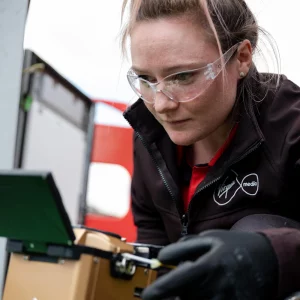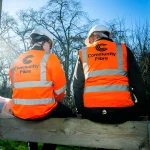Sponsored Links
TFL - Welsh Broadband Notspots could be failed by Digital Britain UK Plans
Posted: 07th Aug, 2009 By: MarkJ
Pembrokeshire-based wireless ( Wi-Fi , WiMAX ) broadband and telecommunications specialist, TFL Group, has warned that the rural broadband solutions proposed by Lord Carter's UK Digital Britain report will not be enough to plug all of the hi-speed Internet access coverage gaps ("Notspots") in Wales.

TFL fears that Welsh businesses will continue to suffer financially because a stalemate appears to have arisen as a result of confusion within the recent Carter report and The Welsh Assembly/BT’s earlier commitment, which aims to upgrade selected areas where a broadband signal could not be received.
According to TFL, at least one of the ‘Notspot’ areas where BT claims to have now delivered broadband under the terms of its agreement with the Welsh Assembly is still not receiving a satisfactory and fully-inclusive service, while the new report simply creates further ambiguity in the market.
Carter's report called for the creation of a subscriber-financed £150m-£175m fund (via a 50p per month levy on all fixed phone lines) to help pay for the delivery of Next Generation Broadband into rural areas, while also discussing the introduction of Mobile Broadband and Satellite technologies into areas where conventional telephone services could not support broadband connections.
It's refreshing to see that we aren't the only ones concerned with the use of Satellite , with its many high costs and other limitations (latency, poor usage allowances, weak upload performance), as a rural broadband solution. TFL, being a wireless provider, is of course speaking from a competitive point of view and seeks to put its own methods across.
According to TFL, wireless delivery of broadband services to Welsh ‘Notspot’ areas remains the only realistic alternative for households or businesses that cannot already receive a broadband service via their local BT exchange. It points to their recent strategic agreement with NTL, which enables TFL to deliver wireless speeds of 10Mbps to rural areas.
We're inclined to agree that Wi-Fi and WiMAX solutions have a lot of potential and can, if deployed correctly, act as reasonably fast and cost effective solutions. However Mobile Broadband , while presently far from perfect , is also set to improve with future LTE technology and we would not be completely dismissive of that; especially once existing 2G spectrum is opened up for wider use (better coverage).

TFL fears that Welsh businesses will continue to suffer financially because a stalemate appears to have arisen as a result of confusion within the recent Carter report and The Welsh Assembly/BT’s earlier commitment, which aims to upgrade selected areas where a broadband signal could not be received.
According to TFL, at least one of the ‘Notspot’ areas where BT claims to have now delivered broadband under the terms of its agreement with the Welsh Assembly is still not receiving a satisfactory and fully-inclusive service, while the new report simply creates further ambiguity in the market.
TFL director, Jonathan England, said:
“What we are seeing in Wales now is the creation of a series of ‘stalemate’ situations, where BT believes it has fulfilled its obligations to the Welsh Assembly. But unfortunately, while we accept that the Assembly is doing everything it can to deliver much needed broadband services, these efforts have still to materialise into tangible high speed internet services from BT.
This situation has now been compounded by the recent publication of Lord Carter’s ‘Digital Britain’ report, which suggests a number of supposed new ‘initiatives’ to deal with the delivery of broadband services into rural areas.
However, we do not see any innovation in the report at all. TFL regards the best solution for Wales as being a combination of technologies deployed to deliver the best possible service for the customer at the best possible price. In that sense, the blinkered approach taken by both BT and Carter are both wide of the mark.”
“What we are seeing in Wales now is the creation of a series of ‘stalemate’ situations, where BT believes it has fulfilled its obligations to the Welsh Assembly. But unfortunately, while we accept that the Assembly is doing everything it can to deliver much needed broadband services, these efforts have still to materialise into tangible high speed internet services from BT.
This situation has now been compounded by the recent publication of Lord Carter’s ‘Digital Britain’ report, which suggests a number of supposed new ‘initiatives’ to deal with the delivery of broadband services into rural areas.
However, we do not see any innovation in the report at all. TFL regards the best solution for Wales as being a combination of technologies deployed to deliver the best possible service for the customer at the best possible price. In that sense, the blinkered approach taken by both BT and Carter are both wide of the mark.”
Carter's report called for the creation of a subscriber-financed £150m-£175m fund (via a 50p per month levy on all fixed phone lines) to help pay for the delivery of Next Generation Broadband into rural areas, while also discussing the introduction of Mobile Broadband and Satellite technologies into areas where conventional telephone services could not support broadband connections.
Jonathan England continued:
“In TFL’s view, the amount of civil engineering work required to upgrade physical telephone lines in Wales alone would far exceed the amount to be made available through the 50p levy – and expecting this money to finance a notspot solution on its own is pure fantasy.
We were also alarmed to see that previously-discredited and cost-prohibitive technologies such as satellite broadband seemed to be back on the agenda – despite having been rejected once already.”
“In TFL’s view, the amount of civil engineering work required to upgrade physical telephone lines in Wales alone would far exceed the amount to be made available through the 50p levy – and expecting this money to finance a notspot solution on its own is pure fantasy.
We were also alarmed to see that previously-discredited and cost-prohibitive technologies such as satellite broadband seemed to be back on the agenda – despite having been rejected once already.”
It's refreshing to see that we aren't the only ones concerned with the use of Satellite , with its many high costs and other limitations (latency, poor usage allowances, weak upload performance), as a rural broadband solution. TFL, being a wireless provider, is of course speaking from a competitive point of view and seeks to put its own methods across.
According to TFL, wireless delivery of broadband services to Welsh ‘Notspot’ areas remains the only realistic alternative for households or businesses that cannot already receive a broadband service via their local BT exchange. It points to their recent strategic agreement with NTL, which enables TFL to deliver wireless speeds of 10Mbps to rural areas.
Mr England concluded:
“Currently, we have a situation where an incumbent network provider wrongly-believes it is fulfilling its agreement with the Welsh Assembly; we have a so-called ‘strategic report’ into Britain’s telecommunications future which seems to look no further than the technologies that BT can already provide and we have an increasingly frustrated group of businesses and households who are still none the wiser about when they might get even the most basic level of broadband service.”
“Currently, we have a situation where an incumbent network provider wrongly-believes it is fulfilling its agreement with the Welsh Assembly; we have a so-called ‘strategic report’ into Britain’s telecommunications future which seems to look no further than the technologies that BT can already provide and we have an increasingly frustrated group of businesses and households who are still none the wiser about when they might get even the most basic level of broadband service.”
We're inclined to agree that Wi-Fi and WiMAX solutions have a lot of potential and can, if deployed correctly, act as reasonably fast and cost effective solutions. However Mobile Broadband , while presently far from perfect , is also set to improve with future LTE technology and we would not be completely dismissive of that; especially once existing 2G spectrum is opened up for wider use (better coverage).
Search ISP News
Search ISP Listings
Search ISP Reviews
Latest UK ISP News








Cheap BIG ISPs for 100Mbps+
150,000+ Customers | View More ISPs
Cheapest ISPs for 100Mbps+
Modest Availability | View More ISPs
Latest UK ISP News
Helpful ISP Guides and Tips
Sponsored Links
The Top 15 Category Tags
- FTTP (6802)
- BT (3882)
- Politics (3075)
- Business (2767)
- Openreach (2663)
- Building Digital UK (2512)
- Mobile Broadband (2476)
- FTTC (2142)
- Statistics (2130)
- 4G (2093)
- Virgin Media (2026)
- Ofcom Regulation (1779)
- 5G (1733)
- Fibre Optic (1604)
- Wireless Internet (1595)
Sponsored
Copyright © 1999 to Present - ISPreview.co.uk - All Rights Reserved - Terms , Privacy and Cookie Policy , Links , Website Rules






























